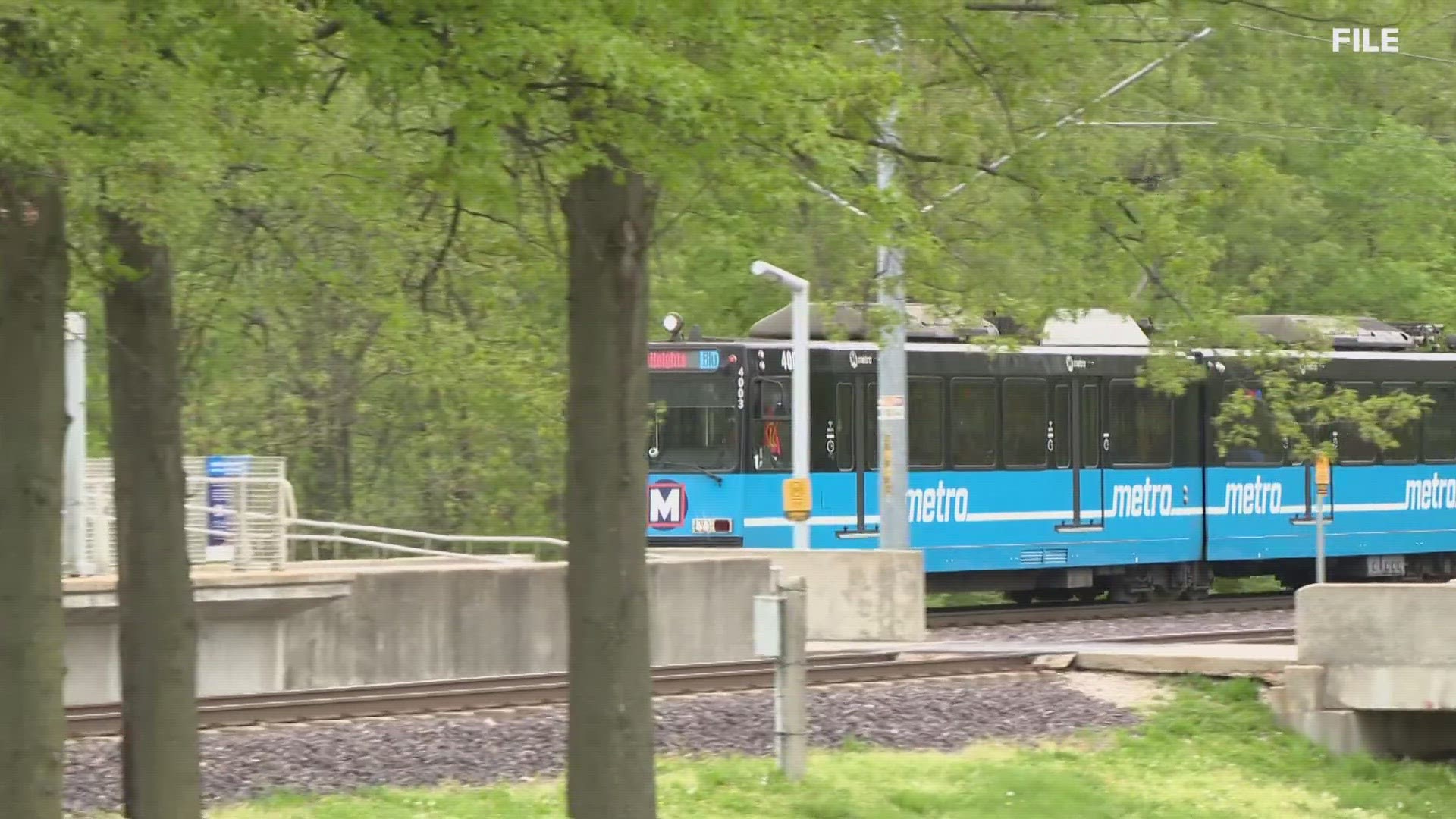EAST ST. LOUIS, Ill. — Police arrested and charged Jarell Anderson, 23, of East St. Louis with murder with intent to kill or injure on Friday in connection to the shooting death of another man while riding an Illinois MetroLink train Tuesday morning.
The U.S. Marshals Service - Great Lakes Regional Fugitive Task Force and the St. Louis County Police Department Special Response Unit took Anderson into custody Friday afternoon. St. Clair County States Attorney James Gomric's Office issued charges shortly after.
Anderson is being held at the St. Louis County Justice Center as of Friday afternoon on a $2 million bond. He awaits extradition back to St. Clair County.
Anderson has previous criminal charges in St. Clair County, including driving with a suspended license, driving an uninsured vehicle, disregarding a traffic light and stop sign and more.
Editorial note: The video above is from July 25, 2023.
Master Sergeant Adam Quirin with the St. Clair County Sheriff's Department said the shooting happened at the Jackie Joyner-Kersee Center station in East St. Louis sometime before 5:30 a.m. The victim, identified as 23-year-old Turyan Austell, remained on the train until it stopped at the Washington Park station before being taken to the hospital for treatment.
Investigators believe the shooter was on the platform of the Jackie Joyner-Kersee Center Station when the shots were fired. The shooter fled the scene before police arrived. Quirin said they were looking for a man, but did not provide any other descriptions.
A spokesman for the St. Clair County Sheriff's Department said Austell later died from his injuries. Nineteen investigators with the Major Case Squad of Greater St. Louis were activated to assist in the ongoing investigation. They investigated over 90 leads in this case, according to their press release.
Investigators were able to establish Anderson as a person of interest early on due to the quick response and teamwork among the Metro Transit Public Safety Division, who allowed viewing of Metro security cameras, and the St. Clair County Sheriff's Department. They received information from the public to then identify Anderson and uncover evidence crucial to the case, according to the press release.
"We've had some incidents on the trains and the video and audio is phenomenal. There are video cameras inside the trains. You can actually see what's being recorded. There's video cameras on the outside of the train by the door. They're really good, they're high def," Quirin said.
MetroLink trains were temporarily not running between the Emerson Park and Washington Park MetroLink stations due to the investigation, according to a news release from Bi-State Development. Normal service resumed Tuesday morning at 8:30 a.m.
"Any time something happens like this we are very saddened. We work diligently to try to prevent as much of this as we possibly can, but this morning, we had a disturbance on one of the trains that escalated into a shooting," said Kevin Scott, general manager of security for Bi-State Development.
"It happened in a very short period of time. It was a heat-of-the-moment type exchange. Those are very difficult for us to predict."
Scott said part of their prevention comes from the Real-Time Camera Center. There are about 900 cameras now and they're working to expand it to 1,600.
"This is a very proactive technology that we have. We watch it in real time, 24/7. We have the capability now to take a look at the footage on the trains, on the platforms in our transportation centers and, you know, we're blanketed with this technology," he said.
It's all a part of the secure platform plan MetroLink is rolling out, which includes gating and fencing.
Scott said this will take it from an open-concept system to a closed one.
"This is basically the eyes of the system. The customer base that we provide security for, everything is moving and so we have to move our assets and stay out in front of things and try to predict as much stuff as possible," he said.
While it may seem like these tragedies happen constantly on the train, the statistics show otherwise. Scott said MetroLink's overall incident rates at the end of this year's quarter were less than 1%.
"They're very rare and what it does is it overshadows all of the exceptional advances that we've made here," he said.
Despite its uniqueness, Scott said they are incidents no one wants to see repeated.
"The staff here, everyone that works at Bi-State, Metro Transit, we all love our city and we're working every day to try to make it better, and it's very frustrating when these types of occurrences happen, but we all work together," he said.
MetroLink recently announced it will be putting in metal detectors at certain stations.
Scott said they will be rolling it out with a four-week pilot starting soon.
The Major Case Squad says "this is unfortunate, tragic, and senseless crime" and was not a random act.


Resources for crime victims
If you have been a victim of a crime or know someone who has been, 5 On Your Side has compiled a list of resources.
The Crime Victim Center of St. Louis has multiple programs to support victims of crime. Crime Victim Center’s programs range from direct services to crime victims as well as “creating awareness and change within the systems they encounter.”
Life Outside of Violence "helps those harmed by stabbing, gunshot or assault receive the treatment, support and resources they need to find alternatives to end the cycle of violence."
The Urban League of Metropolitan St. Louis has the Neighborhood Healing Network, which serves people who have experienced crime, violence or been the victim of an incident that caused trauma.
Cure Violence is an international organization that is present in a handful of St. Louis neighborhoods. Violence interrupters are trained to de-escalate violent situations within their own communities.

